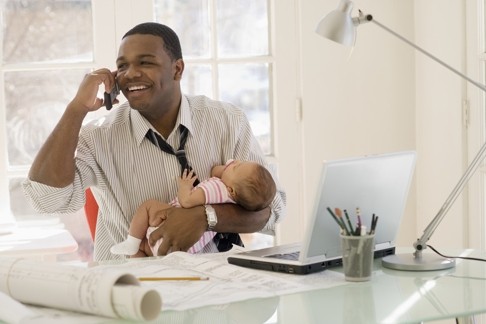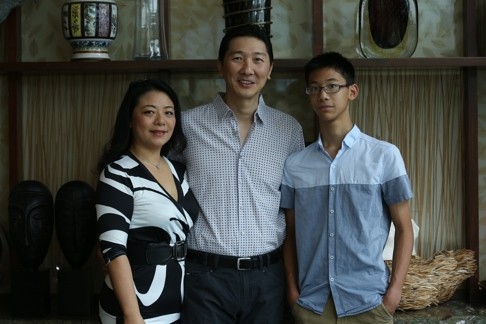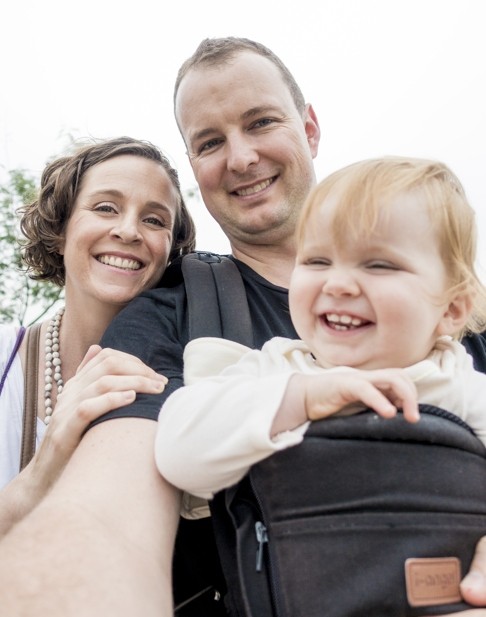
How Hong Kong dads battle to balance work and family - and why men 'feel pressured to show commitment to their work'
Fathers want to spend more time with their children, but say career obligations are preventing them from doing so
When Paul Morris returned to work after a two-week stint at home with his children, he experienced the inevitable emotion many working mothers feel: guilt. Responsible for the day-to-day care of his three children while his wife was out of town, the senior financial consultant enjoyed the opportunity and admits to feeling torn when he returned to work.
“It was great, though challenging, to be involved in every aspect of my kids’ daily lives. My weekends are all about my family but I’d like to be able to see more of them during the week, too. I work long hours, travel frequently, and when I am home I’m usually on conference calls with colleagues in different time zones. I feel guilty being away from my wife and kids this much,” says Morris.
SEE ALSO: What balance? Hong Kong survey shows most working people in city think work-life balance is getting worse
In 2013, Community Business, a non-profit organisation based in Hong Kong that focuses on corporate responsibility, urged companies to create a family-friendly workplace taking into consideration not only women, but also the needs of their male employees. The call for action came following their annual work-life balance survey, which found that 59 per cent of men agree that a family-friendly working environment is one of the top considerations when they choose to join, stay with, or leave a company.

Su Chern Teo, founder and executive coach of Intrinsic Consulting, believes society’s expectations of men at work have lagged behind the changing preferences and obligations of men at home.
“While many progressive firms have established family-support policies, the tougher challenge remains the disconnect between a company’s stated family-friendly, gender-equal policies and the real politics of the working environment, where working men who raise work-life balance requests will not be rewarded by their peers or bosses [either in additional work assignments or in compensation],” she says.
“Consequently, men feel pressured to show commitment to their work and [give a lower priority] to home duties and obligations, which can lead to them feeling stuck, shackled and frustrated.”
Teo believes that while companies must do more to encourage and actively support working fathers, fathers themselves can also take intentional and strategic action to honour their work and family responsibilities.
Matthew Pine, a father of three who works in the education and hospitality industry, says: “I cast a vision for our family and thought how to model our family’s core values, guiding principles and acceptable behaviours.
“In the process, I naturally prioritised time to fulfil my vision; for example, choosing to celebrate certain holidays throughout the year and emphasising various milestones in personal growth and childhood development,” Pine says.
“Other things I do to engage the household are asking good questions and listening to their answers, bringing the kids where I am – for example, travelling on business or taking them to the bank or the tailor with me – and following through with what I say, or apologising to them if I don’t.”
Pine is a co-founder of Dads Network, a non-profit organisation set up to promote awareness of the importance of active fathering. Together with co-founder Allen Ha Wing-on, CEO of Asia-World Expo, they encourage stakeholders such as schools and employers to foster a father-friendly culture.
According to Pine and Ha, men face challenges not only at work, but in their personal lives.

Often, children will go straight to their mothers when there is a school or socially related request, simply because dads can be “a bit clueless”, says Ha. “What would be ideal is for the mothers to rope in the fathers intentionally and consistently so the dads who may not have details don’t get detached from the daily lives of growing children. This calls for the capable mums to reach out and, yes, sometimes step back, so that the other halves start to try, and become active and collaborative. Encouragement from the wives can go a long way.”
It is noticeable that fathers start to disappear as their children advance in their school years, despite school being a big part of their children’s lives. “I get involved as a father in my teens’ school activities and parenting touch points. I have noticed that most often the teachers will address my wife and maintain eye contact with her when discussing matters about our children. There is a subliminal belief that fathers are less capable of being actively involved,” says the father of two.
When Sean Creamer’s daughter was born, he and his wife (both teachers) decided to reduce their working hours and share child-rearing responsibilities. “Communication, social thinking and emotional skills, as well as attitudes and personality, are things children begin to develop in the early years of their life. We wanted to be there for every part of it and support her when she needed it most.”
Creamer is a member of ‘Dads in Hong Kong’ – a Facebook community of more than 1,300 dads, who support and encourage each other in all aspects of fatherhood. This community ranges from fathers employed full time and working freelance, to stay-at-home dads.

While Creamer has returned to work full time, he is determined, like many of his fellow community members, to remain actively involved in his own child’s development. “My daughter is starting to go to playgroups so I will make sure I meet her teachers and school friends. On weekends, my wife and I share parenting responsibilities and take turns to have afternoons off.”
To achieve a true work-life balance and fulfil work and family commitments effectively, it is important for dads to take time off to address their personal needs, says Cristina Rodenbeck, holistic wellness coach at Manipura Wellness Practice. Rodenbeck says she often sees dads who are physically or mentally exhausted, suffering from a range of health issues including anxiety, digestive problems, insomnia, heart disease and weight gain.
“When working fathers reach exhaustion point, memory, concentration and effectiveness problems surface at work. Stressed and frustrated, they can take emotions out on their spouse or children at home. It’s very damaging to all.”
Rodenbeck reminds dads to integrate self-care moments into their daily lives. “Include time in the diary for gym, healthy foods and mindfulness. Even simple things such as travelling with gym clothes or socialising more with friends can make a big difference. Men live in increasingly challenging times. They need to build their personal resilience. Work-life integration is not a ‘nice to have’ but key to thrive in modern days.”
